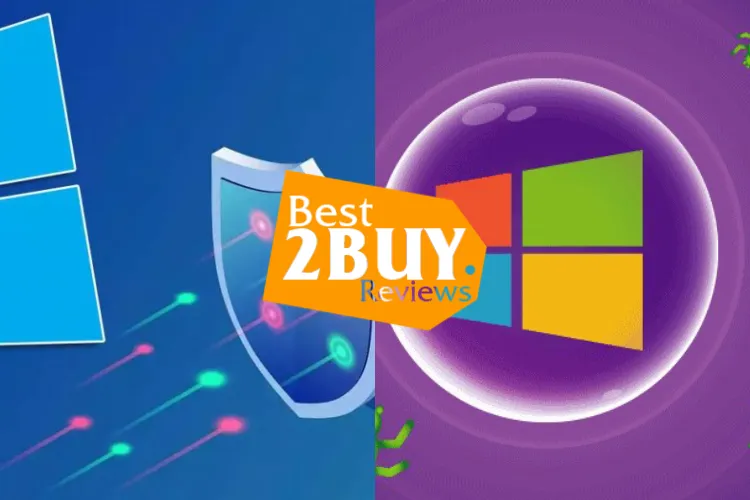Are you looking for reliable antivirus protection for your Windows device? Antivirus For Windows is the perfect solution. It's a software-based program that helps protect your computer from malware, viruses, spyware, and other malicious software. This program is compatible with Windows laptops and provides a number of features to keep your device secure.
- 1. Functions of an antivirus for Windows
- 2. Why should use antivirus for Windows?
- 2.1. Protection against malware
- 2.2. Real-time scanning
- 2.3. Web protection
- 2.4. Email protection
- 2.5. System performance optimization
- 2.6. Firewall protection
- 2.7. Regular updates
- 3. Some popular antivirus for Windows.
- 3.1. Kaspersky Antivirus
- 3.2. Windows Defender
- 3.3. Webroot SecureAnywhere
- 3.4. Norton Antivirus
- 3.5. McAfee Antivirus
- 3.6. Bitdefender Antivirus
- 3.7. AVG Ultimate
- 3.8. Avast Antivirus
- 4. Tips for choosing Antivirus For Windows
- 4.1. Security Features
- 4.2. System Performance
- 4.3. User Interface and Ease of Use
- 4.4. Reputation and Reviews
- 4.5. Compatibility
- 4.6. Additional Features
- 4.7. Customer Support
- 4.8. Pricing and Licensing
- 5. In Conclusion
An antivirus for Windows is a software program specifically designed to protect Windows-based computers from various forms of malware and online threats. It is a type of security software that helps detect, prevent, and remove malicious software from your computer.
Functions of an antivirus for Windows
The primary function of an antivirus for Windows is to scan files, programs, and the overall system for any signs of malware infections. It employs various techniques, such as signature-based detection, behavior-based analysis, heuristics, and machine learning algorithms, to identify and quarantine or remove malicious code.
In addition to malware detection, antivirus software for Windows may offer other security features such as:
- Real-time scanning: It continuously monitors your system for any suspicious activity, scanning files and programs as they are accessed or executed.
- Web protection: It blocks malicious websites, detects and prevents phishing attempts, and warns about potentially unsafe links or downloads.
- Email protection: It scans incoming and outgoing emails for malware attachments or links that could lead to malicious websites.
- Firewall protection: Some antivirus programs include built-in firewalls that help prevent unauthorized access to your computer and protect against network attacks.
- System optimization:Certain antivirus software may offer tools to optimize system performance by cleaning up unnecessary files, managing startup programs, and optimizing system settings.
While Windows operating systems include a built-in antivirus solution called Windows Defender, many users opt for third-party antivirus software for additional features, enhanced protection, and personal preference. These third-party antivirus programs are developed by various security companies and offer a range of capabilities to keep your Windows computer safe from malware threats.

Why should use antivirus for Windows?
Using antivirus software for Windows is essential for several reasons:
Protection against malware
Antivirus software helps protect your computer from various forms of malware, including viruses, worms, Trojans, ransomware, and spyware. These malicious programs can damage your files, steal sensitive information, or disrupt the normal functioning of your computer.
Real-time scanning
Antivirus programs continuously monitor your system for any suspicious activity and scan files in real-time. This helps detect and remove malware before it can cause harm to your computer.
Web protection
Many antivirus programs offer web protection features that can block malicious websites, prevent phishing attempts, and warn you about potentially unsafe links or downloads. This is especially important when browsing the internet as it helps prevent you from inadvertently visiting harmful websites or downloading infected files.
Email protection
Antivirus software can scan incoming and outgoing emails for malware attachments or malicious links. It helps prevent your email account from being compromised and stops the spread of malware through email attachments.
System performance optimization
Some antivirus programs also include system optimization tools that can help improve the performance of your computer by cleaning up unnecessary files, managing startup programs, and optimizing system settings.
Firewall protection
Many antivirus solutions come with built-in firewalls that act as an additional layer of defense against network attacks and unauthorized access attempts. Firewalls monitor incoming and outgoing network traffic, blocking suspicious or malicious connections.
Regular updates
Antivirus software vendors regularly release updates to their programs to address newly discovered threats and vulnerabilities. By keeping your antivirus software up to date, you ensure that you have the latest protection against emerging threats.
While Windows includes its own built-in antivirus solution called Windows Defender, using third-party antivirus software can provide additional features, more advanced threat detection capabilities, and an extra layer of security. It is important to choose a reputable antivirus program and keep it up to date to ensure your computer is protected against the latest threats.
Some popular antivirus for Windows.
Here are some popular options:
Kaspersky Antivirus
Kaspersky is a trusted name in the antivirus industry. It provides real-time protection against viruses, malware, ransomware, and other threats. It also offers features like web protection, email scanning, and network attack protection.
Windows Defender
Windows Defender comes pre-installed with Windows 10 and offers basic protection against viruses and malware. It continuously runs in the background and provides real-time protection.
Webroot SecureAnywhere
Webroot SecureAnywhere is an antivirus and cybersecurity solution developed by Webroot, a leading provider of online security services. It is designed to protect computers, laptops, and mobile devices from various threats such as malware, viruses, ransomware, phishing attacks, and other online dangers.
Norton Antivirus
Norton is a well-known antivirus solution that offers comprehensive protection against various threats. It provides features like real-time scanning, firewall protection, identity theft protection, and more.
McAfee Antivirus
McAfee is another popular antivirus program that offers a wide range of features such as real-time scanning, firewall protection, web protection, and performance optimization tools.
Bitdefender Antivirus
Bitdefender is known for its strong antivirus engine and proactive protection against malware. It offers features like real-time scanning, web protection, ransomware protection, and anti-phishing.
AVG Ultimate
AVG Ultimate antivirus is a comprehensive security solution provided by AVG Technologies. It combines antivirus protection with other security features to offer a complete package for protecting your devices.
Avast Antivirus
Avast is a popular free antivirus program that offers basic protection against viruses and malware. It also provides additional features such as web protection, email scanning, and a Wi-Fi inspector.
These are just a few examples of antivirus programs available for Windows. It's important to note that while having antivirus software is crucial for protecting your computer, practicing safe browsing habits and keeping your operating system and software up to date are equally important for maintaining a secure computing environment.
Tips for choosing Antivirus For Windows
When choosing an antivirus program for Windows, it's important to consider several factors to ensure you select the most suitable option for your needs. Here are some key points to keep in mind:
Security Features
Look for antivirus programs that offer comprehensive security features, including real-time scanning, malware detection and removal, web protection, email scanning, and firewall. Make sure the antivirus software provides robust protection against various types of malware, viruses, ransomware, and other online threats.
System Performance
Consider the impact of the antivirus software on your system's performance. Look for programs that are lightweight and don't significantly slow down your computer during scans or regular usage. Check for features like optimized scanning that minimize system resource usage.
User Interface and Ease of Use
Choose an antivirus program with a user-friendly interface and intuitive controls. The software should be easy to navigate and configure, allowing you to customize the settings based on your preferences. A clear and organized interface can make it easier to manage and monitor your system's security.
Reputation and Reviews
Research the reputation and user reviews of different antivirus programs. Look for independent test results and reviews from reputable sources to gauge the effectiveness and reliability of the software. Customer feedback can provide insights into user experiences and satisfaction.
Compatibility
Ensure that the antivirus program is compatible with your specific version of Windows. Check the system requirements and verify that the software supports your operating system to avoid any compatibility issues.
Additional Features
Consider any additional features or utilities offered by the antivirus software. Some programs include extras like password managers, VPN services, file shredders, or system optimization tools. Evaluate whether these additional features align with your needs and if they provide value beyond basic antivirus protection.
Customer Support
Assess the availability and quality of customer support provided by the antivirus company. Check if they offer multiple support channels such as phone, email, or live chat. Reliable customer support can be helpful if you encounter any issues or have questions regarding the software.
Pricing and Licensing
Review the pricing options and licensing terms for the antivirus software. Some programs offer free versions with limited features, while others require a subscription or one-time purchase. Consider your budget and the value provided by the antivirus program when making your decision.
By considering these factors, you can make an informed decision and choose an antivirus program that provides effective protection for your Windows system while aligning with your specific requirements and preferences.
In Conclusion
An antivirus for Windows is a software program is an essential for your computer. With this software, you can rest assured that your computer is safe from viruses, malware, and other malicious files. It works by scanning your computer and removing any malicious files it finds. Additionally, it can help prevent you from accidentally downloading or running malware. To find the best antivirus protection for your Windows device, check out our featured section. After using and checking carefully evalation from experts and users, we listed top best Antivirus for Window for you. Read carefully and find the best solutions for your computer. Good luck!











